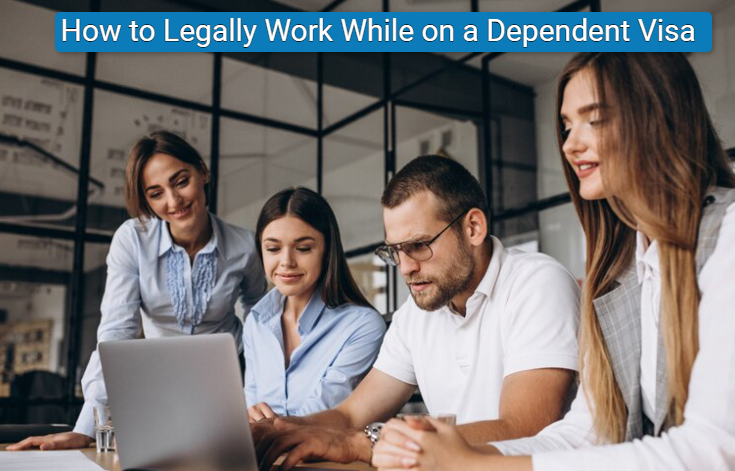How to Legally Work While on a Dependent Visa

Introduction
Obtaining a dependent visa provides an option for family members to remain together during extended stays overseas. For most dependents, however—particularly spouses—the capacity to be legally employed when on a dependent visa can make a huge difference in terms of financial security, career development, and overall living standards.
Conditions for working as a dependent vary widely between countries, and even between subclasses in some countries. This guide will take you through all you should know about working legally on a dependent visa—with a special focus on the United States, where most confusion and complicated regulations happen.
Understanding Dependent Visas and Work Rights

A dependent visa is given to the family members of a main visa holder, typically a permanent resident, skilled worker, or student, to reside in the same nation for the validity of the main visa. This will most often be spouses, children, or partners. Although residence rights will be relatively simple, work rights are much more limited.
In the U.S., varying dependent visas allow for varying permissions to work. For instance, spouses of foreign students (holders of F1 visas) get an F2 visa, whereas spouses of highly skilled workers with H-1B visas get an H4 visa. These categories decide whether the dependent can work legally.
Let’s clarify this, beginning with the most frequently confused dependent visa category the F2 visa.
Can You Work on an F2 Visa in the United States?
The F2 visa is available for dependents (often spouses and children) of F1 visa holders, who are mostly international students engaging in full-time academic studies in the U.S.
No General Work Authorization
Most often asked question is: can a f2 visa holder work in usa or can you work on an f2 visa? The answer is a simple no—F2 visa holder cannot work on paid employment in the U.S.
As per USCIS policies:
- F2 visa holders can work in usa → Not allowed
- Can I work with an f2 visa → Only if you convert your visa status
- F2 visa work eligibility → No work eligibility is given
- F2 visa work permit or f2 work permit → No such permit is available for F2 category
- F2 visa can work part-time → Not even part-time work is permitted
The ban is on all forms of employment: full-time, part-time, telecommuting, freelance, or internships (even unpaid internships that are against labor laws).
What Can F2 Visa Holders Do?
Although f2 visa working permit is not issued, F2 holders can:
- Study part-time (new rule developments even permit full-time study in certain instances)
- Volunteer with officially registered not-for-profit organizations (so long as it’s genuinely unpaid and not substituting an employed role)
- Join the main F1 visa holder for the period of their studies
If you’re an F2 visa holder and want to work, the only legal choice is to switch your visa status (e.g., to F1, H1B, or H4 depending on eligibility).
Can Spouses of H1B Visa Holders Work in the U.S.?

Yes—but with restrictions and processes involved.
Spouses of H1B visa holders receive H4 visas. Whether they can work depends on their status in the H4 category.
Work Authorization for H4 Visa Holders
If you’re asking can h4 work in usa or can i work in h4 visa, the reply is a yes, but strictly with an Employment Authorization Document (EAD).
The rules of eligibility are as follows:
- The H1B visa recipient must have an approved I-140 (green card sponsorship)
- After an approved I-140, the H4 spouse can apply for an EAD
- After approval, the H4 visa holder can work unrestricted by employers, unlike H1B visa holders who are employer-bound
This means:
- Can h4 visa holders work in usa → Yes, with EAD
- Spouse h1b visa work → Yes, with due approval
- Spouses of h1b can work → Conditional yes
- Can the spouse of the h1b work in us or spouse of the h1b can work in usa → Yes, under EAD provisions
Recent Updates
A recent regulation has also relaxed the process of H4 spouses working without renewing their EAD each time, provided that the underlying H1B status is retained and I-140 is valid.
This provision benefits h1b spouse working and eliminates employment gap fears.
Work Options for H4 EAD Holders
An approved H4 EAD enables you to:
- Work full-time or part-time
- Begin a business or freelance
- Switch jobs without sponsorship
- Work in any industry or sector
That’s far better than H1B visa holders, who are employer-tied and require labor certification and job-specific sponsorship.
So if you are searching h1b spouse work permit or can h1b spouse work, the reply is a resounding yes, with EAD.
Differences Between F2 and H4 Work Rights

| Category | F2 Visa | H4 Visa |
| Can legally work? | ❌ No | ✅ Yes, with EAD |
| Can study? | ✅ Part-time or full-time (recent rule) | ✅ Full-time allowed |
| Needs employer sponsorship? | ❌ Not eligible for any work | ❌ EAD holders don’t need sponsorship |
| Can freelance/start a business | ❌ No | ✅ Yes |
This comparison is essential for those asking questions like:
- Can i work on f2 visa → ❌ No
- H1 visa dependent can work → ✅ Yes, if EAD approved
- Can h1b visa dependent work in usa → ✅ Under certain conditions
How to Transition from a Dependent Visa to a Work Visa
If you’re on a dependent visa with no work rights—like the f2 visa—you still have options to work legally by transitioning to an appropriate visa class.
1. Switch to a Student Visa (F1, Tier 4, etc.)
- Allows work rights via CPT/OPT in the U.S. or part-time in the UK
- Must be admitted into an approved institution
- Needs evidence of financial capability
Best if you’re posing can I work with an f2 visa and also wish to study?
2. Transition to an Employer-Sponsored Work Visa (H1B, Tier 2, etc.)
- The employer has to file a petition/sponsorship
- Time-consuming but possible, particularly for high-demand skills
For instance:
- H1 visa dependent can work → Transition from F2 to H1B
- H1b visa for dependent → Becomes a main visa holder
3. Transition from F2 to H4 (if spouse transitions to H1B)
- This allows you to ultimately be eligible for f2 visa work permit options such as H4 EAD
- Once the I-140 is approved, you can work
Helpful if your spouse is moving from student to work status.
Ready to Turn Your Visa Into Opportunity?

Whether you are considering work options on a dependent visa or arranging your extended stay in the U.S., our specialist immigration lawyers at Passage Immigration Law are here to help you—step by step, legally, and with confidence.
